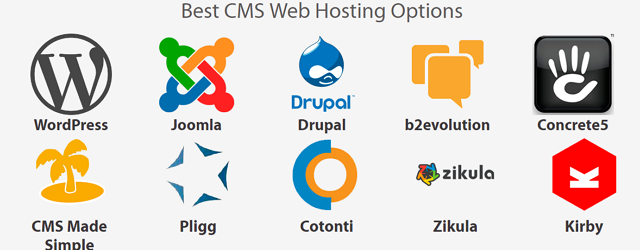Guide To ChooseThe Right CMS
Choosing The Right CMS For Your ECommerce Website
Choosing the right CMS is a daunting task in itself. It becomes more challenging when you need to choose a CMS platform for your own company. There are a plethora of CMS platforms available out there. However, you need to be aware of the benefits and the drawbacks of each to be able to choose the perfect one.
You are going to find two kinds of CMS platforms in the market: open source and proprietary. You will be able to modify and customize the open source CMS platform according to your business needs. However, only coders can update and improvise on this CMS platform. It can be downloaded and used for free. On the other hand, proprietary CMS platform can be created, modified as well as controlled by a company. Also, there is a licensing fee for using this CMS platform.
Things You Need To Take Into Account While Choosing The Right CMS
There are certain things you need to keep in mind in order to select the right CMS for your website. Here is a list of the things to enable you to make an informed choice:
The Scope Of Customization
If you want to choose the right CMS for your website, you need to know the extent to which that CMS platform allows you to edit your site. In addition to that, you also need to know whether you can add widgets or make changes to the color and shape of the layout with that CMS platform. This needs to be the primary concern while choosing the right CMS platform.
Access And Permissions
With the right content management system, you will be able to reach a lot of people. Also, the CMS platform you choose needs to offer multiple permission levels. The admin will be capable of editing anything on the site. However, the ideal CMS platform can also offer access to certain people for making changes to certain sections of the website.
Technical Assistance
There are a few CMS platforms that offer free technical assistance. This technical support can come to your rescue if you are unable to afford downtime and need constant help.
Customization By Users
Most of the CMS platforms allow users to develop plugins or widgets. You can take help from an in-house developer or a developer outside your company to create and promote those add-ons.
Seamless User Experience
An essential yardstick of choosing the right CMS is to take into account the user’s perspective. A content management system that ensures a seamless user experience should top your priority.
SEO Optimization
Most of the CMS platforms include a pre-built SEO. The SEO feature adds to the advantage as it helps the search engines to index your website. Therefore, this is a vital aspect that you need to keep in mind about choosing the right CMS.
Cost Of The CMS Platforms
Although there are a lot of CMS platforms available for free, other CMS platforms charge you for some additional features. Whether you are just starting out or have an established business, the cost of the CMS platform needs to be taken into consideration.
Which CMS( Content Management System) Platform Is Appropriate For Your Website?
The right content management system allows you to update effortlessly and add new pages without any hassle. Knowing the pros and cons of the content management systems helps you in choosing the right CMS for your website.
Drupal
This CMS platform is specially designed for developers. Users who are not experienced in coding would not be able to use it.
Pros: Drupal is extremely flexible and is an excellent option for creating e-commerce stores. More importantly, Drupal is known for its ability to organize and categorize content that has a certain level of complexity. Additionally, the community of developers for Drupal is very active making it easy for you to access it.
Cons: Unless you are a developer, it may be difficult for you to navigate Drupal. While the flexibility and scalability of Drupal may be appealing, you will have to invest a considerable amount of time to learn the software.
Joomla
Just like Drupal, Joomla has also been created for developers. By the same token, it is also easier to learn and use when compared to Drupal. The cost of setting it up, customizing and maintaining is more than WordPress but less than Drupal. While choosing the right CMS platform for your e-commerce website, Joomla can be a reliable option.
Pros: Joomla can be a great option for creating dynamic sites. Without having to manually update, you will be able to add templated portions with Joomla.
Cons: The obvious downside of choosing Joomla is that it has been designed for developers. If you happen to choose Joomla for your e-commerce website, you will need to seek help from a professional Joomla developer. You can take that help from one of your staffs or hire a reliable web development company.
WordPress
Although WordPress was initially built as a blogging platform, it has become a popular name as a CMS platform. Even someone with no experience in web development can use WordPress for basic applications. At the same time, an experienced web developer can use it for creating large and complex websites. While choosing the right CMS platform, WordPress is an obvious choice for many in the web development industry.
Pros: There are multiple themes that are available on WordPress that are user-friendly and inexpensive. With the wide array of plugins and add-ons available on WordPress, even an amateur in web development can create and launch a site with remarkable ease.
Cons: It is not difficult for an experienced web developer to create an amazing website with the custom plugins and applications on WordPress. Nonetheless, WordPress has also been criticized for its security issues. However, it is only susceptible to hacking if you do not take the necessary precautions. An efficient web developer can ensure that the admin passwords are strong thereby securing your website.
Shopify
The functionality of this CMS platform is incredible. Shopify can create SEO-friendly listings. With its drag and drop feature and statistics about your online store, this can be a great option as a CMS platform. Choosing the right CMS is not a difficult process if you are aware of the advantages and disadvantages of each CMS platform.
Magento
A lot of e-commerce websites make use of Magento as a CMS platform. There are both free as well as paid-for editions. It has specifically been designed for e-commerce platforms. In addition to that, there are countless plugins that can enable you to add different payment gateways. However, if you want to access other features on Magento, it may get expensive very quickly.
Exponent
This is one of the best free content management systems that are available in the market. It supports multiple users as well as roles. On Exponent, you will also be able to edit the pages directly. There is no need to log into a dashboard system with Exponent. If you are aware of the specific needs of your business, choosing the right CMS platform does not have to be a challenging affair.
The essential purpose of a content management system is to provide you with the ability to create and edit the content without any difficulty. While choosing the right CMS, you need to keep in mind this purpose.





